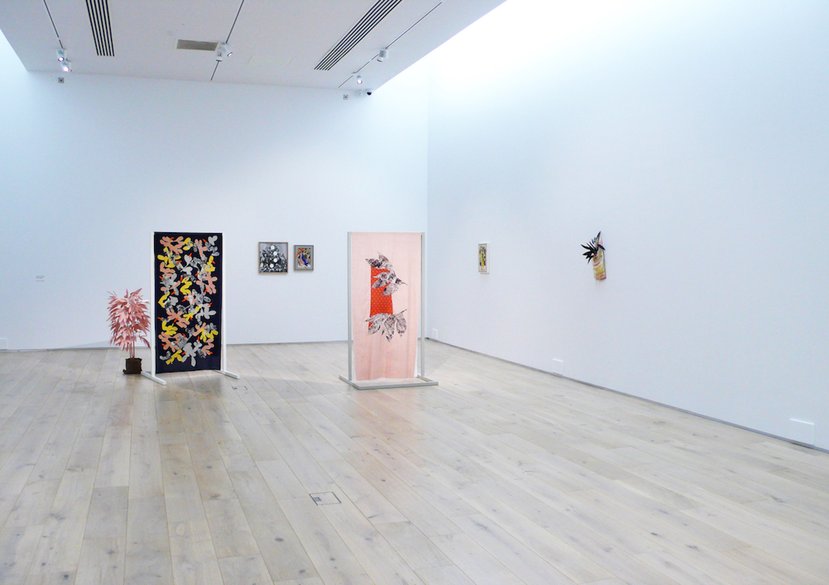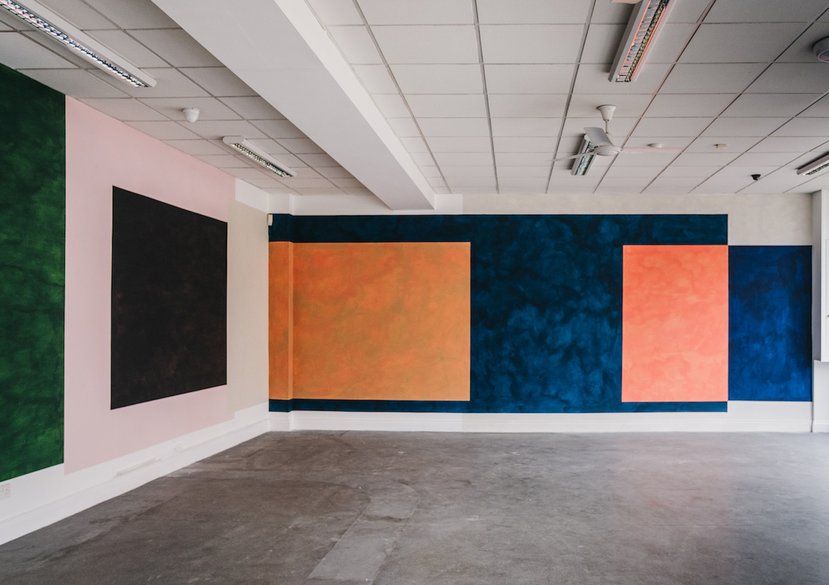
Fiona is a mixed media artist, she works towards exhibition and site-related public commissions as well as writing on art, ecological politics and environmental thought.
Fiona received her PhD from the Slade School of Fine Art, University College London in 2016, with the thesis: Towards a Fractured Topography of the Present: Art, Ecology and the Political Economy of Speed. Fiona previously read Philosophy at the University of Manchester and studied at Manchester School of Art where she also worked as a Senior Lecturer from 2005 to 2014. Fiona has held external examining positions at NCAD, Dublin (Applied Material Cultures programme 2016-2020) and West Dean College of Arts and Conservation (MFA Fine Art programme 2017-2022).
Key details
School, Centre or Area
Gallery
More information
Practice
Fiona Curran works with painting, textiles and site-specific installation, exploring the poetics and politics of landscape space and the impacts of screen-based technologies on our sensory engagement with the natural world. The presence of a heightened colour palette in her work, alongside collaged and layered surfaces, mimics the fractured, illuminated and seductive spaces of the computer screen whilst immersing the viewer in a more physical and sensory engagement with colour, materials and space. Fiona has an interest in the notion of enclosure, exploring this through the division of space using shape and pattern alongside ideas of placement, view and containment. Her work also draws from histories of the decorative and the impulse to bring the outside world in to the interior.
Fiona Curran has also produced a number of public art commissions working with organisations including The Contemporary Art Society, The National Trust, Arts & Heritage and Kielder Art & Architecture. These site-related works extend the artist’s practice into the physical landscape reflecting on the notion of heritage as an ongoing, and often contested, project of inheritance where the past might be reclaimed and reimagined.
Fiona also writes about art, ecology and environmental thought. Her research joins trans-disciplinary work undertaken in the Arts and Environmental Humanities in response to climate change and speculative post-anthropocentric political thought. Her writing focuses on environmental art as an expanded field of ecological practice. She welcomes research students interested in these fields and in the pursuit of textiles as a fine art practice.
Awards
2019 QEST Scholarship (Tapestry)
2011 RIBA (MSA) Small Project Award for the site-specific commission, This time next year things are going to be different, produced for the Tatton Park Biennial in 2010.
Current and recent projects
Fiona's academic research sits within the emerging field of the environmental humanities and post-anthropocentric ecological thought. Recent presentations and publications have focused on the critical significance of landscape in contributing to an expanded environmental sensorium that takes account of the material conditions of knowledge production. The research is further guided by interrogating the environmental impacts of screen-based technologies since the 1960s, highlighting their contribution to a political economy of speed that diminishes our sensory engagement with the natural world. Whilst this research is ecological in intent, it critiques the concept of 'environmental art' and the application of this term to a niche area of practice. Landscape is presented as relationally constituted and assembled through specific cultural, economic, technological and material practices. Heritage is explored as an ongoing and contested project of inheritance.
Recent research is focused specifically on the notion of ‘tactile materialisms’ that deploy textile processes as a mode of thinking through these questions of ecological relation. Textiles’ significance within global trade networks, within indigenous, colonial and postcolonial histories and its material connection to expanded ecologies of the animal, vegetable and mineral across multiple geographical and cultural contexts, as well as its close links to the emergence of computing technology (via the development of mechanised systems of production and binary code), position it as a particularly rich area for further research in this field.
Publications, exhibitions, other outcomes
Exhibitions / Commissions
Fiona Curran has exhibited widely in the UK and internationally. Recent public art commissions include Bright Shadows Point, a permanent sculptural work for Turing Locke in Eddington, Cambridge, commissioned through the Contemporary Art Society (2021); Your Sweetest Empire is To Please, a site-specific project for the National Trust at Gibside, Gateshead, commissioned by the National Trust, Newcastle University and the AHRC (2018); The grass seemed darker than ever, a site-specific project for Kielder Art & Architecture at Kielder Forest in Northumberland (2016); An accident looking for somewhere to happen commissioned by Locws International for Art Across the City, Swansea (2012) and This time next year things are going to be different commissioned by Parabola for the Tatton Park Biennial, Tatton Park, Cheshire (2010).
For solo and group exhibition details please see the artist’s website: www.fionacurran.co.uk
Recent Conference Presentations and Publications
2019
‘Thinking About Craft: From Imaginary Bodies to Bodies of Imagination.’ Craft(ing) The Body Symposium, The Crafts Study Research Centre, UCA Farnham.
‘Your Sweetest Empire is to Please.’ Contemporary Art in The Heritage Experience Conference, Newcastle University.
2018
Co-organiser (with Freddie Robins) of Feminisms & Materialisms Symposium, Royal College of Art.
2017
‘Between the earth and the sky: planetary borders in Vija Celmins’ Untitled (Desert/Galaxy).’ Border Control: On The Edges of American Art, Conference, Tate Liverpool.
‘Losing Ground in a no knowledge zone: Pierre Huyghe’s Antarctic Journey that Wasn’t.’ Journal article in Kritische Berichte 2: 2017 on the theme of (Post)Nature / Natur(T)Räume, Edited by Louise Malcolm and Anna Minta.
‘A Geography Without An Author: Unreliable Facts, Fantastical Fictions.’ Journal article in OAR (Oxford Artistic and Practice Based Research Platform) Issue 2 on the theme of Validity.
2016
'Cloud Ecologies: Weather, Pollution, Time and Data', Mutating Ecologies in Contemporary Art Symposium at MACBA (Museum of Contemporary Art, Barcelona). Also a Book Chapter in Mutating Ecologies in Contemporary Art. Ed. Christian Alonso, University of Barcelona Press. (2018)
'Satellite's Gone: Materialities of the Space Race, Atmospheric Politics, Drifting Clouds', Speeding & Braking Conference, Goldsmith's University, London.
2015
‘Thinking Thought Otherwise: Cannibal Metaphysics and the Resistance to Ideal Form’, Transvaluation: Making The World Matter Conference, Chalmers University of Technology, Gothenburg, Sweden.
2014
‘Anxious Objects’, Journal Article in Disegno, Vol.7.
‘Thinking the Interior: Atmospheric envelopes and entangled objects’, SITUATION Symposium, RMIT, Melbourne.
‘Cannibalising Nature: Resituating Hélio Oiticica’s Tropicália as ethical-environmental practice’, Reading and Exhibiting Nature Conference, University of Westminster, London.
External collaborations
Fiona is a studio artist at Wysing Arts Centre in Cambridge, she was an external examiner at NCAD, Dublin (2016-2020) and West Dean College of Arts and Conservation, Sussex (2017-2022). Fiona was a member of the Board of Trustees at The Florence Trust (an international residency programme based in London) from 2015-2018, an editorial board member of the Journal Arts published by MDPI from 2017-2019 and was a peer reviewer and conference chair for the Critical Textiles track at the 2019 Conference Textile Intersections held at Loughborough University. Fiona has acted as a peer reviewer for publications spanning the fields of Fine Art, Textiles, Environmental Humanities, New Materialisms and Heritage Studies with publishers including Bloomsbury, Palgrave and Routledge.




